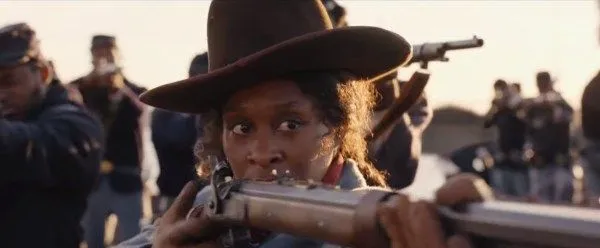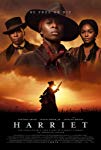Eye For Film >> Movies >> Harriet (2019) Film Review
Harriet
Reviewed by: Jennie Kermode

Casting Harriet Tubman was never going to be easy. When, back in November, writer/producer Gregory Allen Howard revealed that a studio executive had suggested Julia Roberts for the role (not only the wrong colour but about a foot too tall), there was an understandable outcry, yet no-one was wholly surprised. Some 17 decades after Tubman first came to notice with her daring escape from Maryland slave holders, racism remains a huge problem in her country, but at least slavery itself is gone, and she played a significant role in that.
With several different African American actresses suggested over the years, the film got lucky with Londoner Cynthia Erivo, who captures something of the power of Tubman's gaze and, more remarkably, her force of will. The performance she delivers is the film's greatest asset and makes her a serious contender this awards season, but though she dominates the film, she's not all there is to appreciate here. John Toll's cinematography and Terence Blanchard's score both add something special that elevates this beyond run-of-the-mill biopic status and give it something of the weight it deserves.

Tubman's life was a long and complicated one taking in several different prominent contributions to the development of US society. Howard and co-screenwriter/director Kasi Lemmons have chosen to focus on its earlier stages. Her military career is addressed only in postscript, her career as a thinker and political reformer barely at all, though the seeds of both are clearly present in what we do see. This will disappoint some viewers - there is no suggestion that a sequel will be forthcoming - but there's still more than enough material here for a two hour film, and few biopics deliver this much in terms of action and danger.
Focusing on Tubman's escape and her subsequent work to free others, this film establishes a narrative that fits the way contemporary accounts suggest Tubman saw herself but that has very rarely been seen in cinema: that of an enslaved person who is not simply a victim or a lucky survivor but who is fully subjective and in possession of an independent will. We learn all we need to about how she and her loved ones have suffered (without any gratuitous scenes of torture or rape) but even in the earliest stages of the film she comes across as somebody capable of making her own choices, and once she finds her groove she makes a compelling heroine. Lemmons explores her mystical side and the belief that she communicated directly with God (there's a brief reference to the brain injury that may have played a role in this) but doesn't restrict the portrayal to conventional saintly behaviour. The Harriet we see here is fierce, witty, dashing and clearly delighted by the opportunity to foil the bad guys in a series of daring escapades.
Whilst the structure of these parts of the film is quite conventional, it's grounded in audience awareness of the very real danger people like Tubman faced, and some of the escape sequences will have your heart racing. In and around the action we catch glimpses of the bigger picture, with ongoing tensions between the northern and southern states, the cautious politics of Canada and the various legislative changes that took place across these territories - decisions made by comfortable white men which had colossal effects on black people's lives. Lemmons effectively creates a sense of the remoteness of these decisions and the additional sense of powerlessness they created in many people. We see how slowly news trickled in and out of isolated communities whose inhabitants were largely illiterate, and also get a sense of how big a factor distance was in the period, in the absence of accessible transport. This helps audiences to make sense of cultural difference and have more respect for what the characters can achieve in spite of their circumstances.
Lemmons' big achievement lies in the creation of a film that has no difficulty engaging a modern audience yet remains true to its historical context, and a film that will reach viewers of all races without compromising on any aspect of Tubman's politics or inserting extraneous white characters. Her interpretation of Tubman embodies core American values centred on personal liberty and self-empowerment. Within this framework, Erivo shines.
Reviewed on: 10 Dec 2019
















